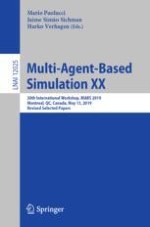2020 | OriginalPaper | Chapter
On Developing a More Comprehensive Decision-Making Architecture for Empirical Social Research: Agent-Based Simulation of Mobility Demands in Switzerland
Authors : Khoa Nguyen, René Schumann
Published in: Multi-Agent-Based Simulation XX
Publisher: Springer International Publishing
Activate our intelligent search to find suitable subject content or patents.
Select sections of text to find matching patents with Artificial Intelligence. powered by
Select sections of text to find additional relevant content using AI-assisted search. powered by
